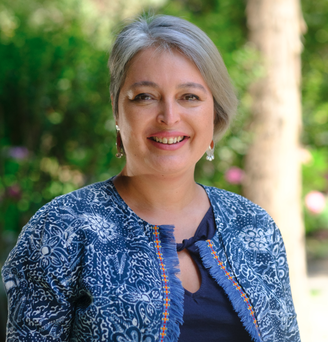Oscar Mendoza
Posted November 12, 2025
Chile 2025 — is the post dictatorship consensus truly and wholly over?
Oscar Mendoza wonders whether — as all opinion polls predict — Chile will go the way of an extreme right-wing populist president or do the highly unlikely/unthinkable and choose a working-class communist woman instead.

GAZING AT MY crystal ball, given that I’m writing in the eve of the first round of the presidential elections in Chile scheduled for Sunday 16 November, I am confident in my prediction that Jeanette Jara, a 51-year-old woman born in the working-class area of Conchalí in northern Santiago, will achieve the largest share of the vote but fail to achieve the required 50% plus one of the vote to win outright.
Jara is a shining example of an individual’s capacity to overcome fairly unsurmountable barriers to become a highly accomplished and successful person. Hailing from a poor background, certainly the humblest of all Chilean presidential candidates in history, through her tenacious efforts and plenty of talent, Jara achieved degrees in public administration and law.
Her political career started in her youth as a member of the Communist Party, becoming President of the Students’ Federation of the University of Santiago (FEUSACH) while completing her first degree. Her steady ascent culminated — until now — in having served as a successful minister of Labour and Social Welfare under current president Gabriel Boric, a post she resigned from to throw her hat into the presidential ring.
Any other first-round result would be the biggest surprise (fiasco?) in history. A multitude of opinion polls have shown Jara consistently leading since she decisively won the June primary. Although this is her first attempt at the highest office, Jara became the official nominee.
Who joins Jara in the second-round run-off is literally anybody’s guess!
José Antonio Kast, a 59-year-old lawyer and leader of the extreme right-wing populist Republican Party, was the early favorite. His father arrived in Chile in 1951 from Germany, where he had been an army officer and Nazi Party member. However, Kast’s polling has been falling slowly but steadily as the vote nears.
Kast’s gradual loss of support opened the door — however slightly — to Evelyn Matthei, the candidate of the more “traditional” right-wing parties in Chile, National Renewal (RN) and her own Independent Democratic Union (UDI), as well as to the most radical of the right-wing populists Johannes Kaiser, leader of the extreme nationalist National Libertarian Party (PNL). Both tied for third place when opinion polls closed on November 1st.
Kast won the first-round presidential election in 2021 but lost by a large margin to the current incumbent Gabriel Boric in the run-off.
Matthei, the daughter of Air Force general Fernando Matthei (a member of the military junta from 1978 until the return of a democratic government in 1990), is 72. She studied Economics at the Catholic University and later taught International Economics. She has a long political career behind her, most recently as mayor of the commune of Providencia in Santiago.
Matthei was already a presidential candidate in 2013, when Michelle Bachelet defeated her soundly in the run-off with 62% of the vote.
If a week is a long time in politics, it’s evident that a year or two is an eternity. Matthei was so far ahead in the polls during the second half of 2023 and the whole of 2024 (prior to being formally nominated by UDI in January this year) that it seemed to be a foregone conclusion that she would become the next president.
Some even thought that with good campaign momentum she might win in the first round. Now, she could end up in fourth place!
Kaiser, the youngest of the major candidates at 49 years, is perhaps the one most representative of modern-day populist politics. He broke from Kast and his Republican Party to form a more extreme and outspoken nationalist movement on the back of his popular YouTube channel.
Unlike the other leading contenders, Kaiser started degrees in Chile, Germany and Austria but never completed any. He might best be described as an activist politician and currently serves in the lower chamber of deputies.
The Lower Tier
There are another four candidates running for president. However none has a realistic chance of reaching the December runoff.
Of these, the one who will in all probability achieve the highest vote is Franco Parisi, 58. He has a PhD. in business administration from the University of Georgia and resides in Alabama.
Although he campaigned solely from the United States when he ran for president on the People’s Party (PDG) in 2021, Parisi received almost 13% of the vote. He came in third, after Kast and Boric. Running as an independent in 2013, he received 10%.
The polls predict that Parisi will achieve something in between his two previous results, meaning that his supporters will play a critical role in the second-round. While Parisi himself is likely to side with whoever is the right-wing candidate, what his supporters will do is less clear.
Marco Enríquez-Ominami (MEO), 52, a graduate in philosophy who then went on to become a film producer and director, is on his fifth presidential campaign. He enjoys very high levels of recognition as his father Miguel was the leader of the Movement of the Revolutionary Left (MIR) and assassinated by the military in 1974. His adoptive father is Carlos Ominami, a prominent politician who has served as minister and senator; his wife is the famous TV presenter Karen Doggenweiler.
MEO’s first attempt, in 2009, as an independent, resulted in a third-place win with just over 20% of the vote. By 2013, his vote total was cut in half and in 2017 cut to 5%. In 2021, representing his own Progressive Party (PRO), his vote total went up slightly to 7.61%. According to the polls, this time around his expected vote share will be below 5%.
Harold Mayne-Nicholls, 64, a journalism graduate and high-profile sports administrator, is running as an independent. Polls show that he’s not managed to make an impact during the campaign.
Finally, Eduardo Artés, a 74-year-old teacher representing his own Patriotic Union (UP) for the third time, is considered an anti-system far-left candidate. He is expected to barely register in the first round.
Because political parties and independent candidates are reimbursed their campaign expenditures by the Chilean state for each vote they receive, Artés is often accused of running a “political SME” (small and medium enterprise). That’s also said about Parisi and Enríquez-Ominami. Even for those getting a small percentage of votes, their campaigns will receive $1.50 per voter in the first round.
The campaigns will surely be the subject of many an opinion piece, book and PhD. thesis after the dust is finally settled on Sunday, 14 December with the final election reults.
Jockeying Among the Right
For now, there’s unanimity in the polls that irrespective of which right-wing candidate Jara might face, she would lose against any one of them. The only subject of debate is the margin of that defeat.
Because the top three — Kast, Matthei and Kaiser — refused to take part in the primary, this first-round election has been referred to as the “primary of the right.” When questioned, respondents consistently state that Kast will be the next president. However, as we get closer to voting day, Kast’s securing a place in the run-off is no longer certain.
What makes the outcome even harder to forecast is the fact that for the first time since 2013 voting is mandatory. This rule was imposed to combat lack of voter participation. In 2021’s first round less than half of registered voters turned up.
With 2021’s run-off election vote at 55.6%, there was a strong sense that the lack of participation was leading to a loss of legitimacy. That moved Congress to change the rules. As a result, a much larger turnout, perhaps as high as 80%, will take part this time.
Added to the increase of almost 800,000 registered voters are 100,000 immigrants who have acquired voting rights after five years or more of Chilean residency. This has added even more uncertainty to the outcome.
The University for Development (UDD) and its Citizens Panel survey, which shows a captive sample of 3,200 people surveyed over time and have asked the same questions time and again, distinguishes between “forced” and “voluntary” voters. In its most recent study, conducted at the end of October, the survey again showed, as it had previously, that “forced” voters tend to favor candidates in opposition to Boric’s government and the official candidate Jeannette Jara.
By the same token, there may be as many as one million registered voters from immigrant communities. A quarter hail from Venezuela, mainly oppositionists to the Maduro regime. Ironically, they favour right-wing anti-immigration candidates.
While 20% of voters surveyed state that they remain undecided right up to the moratorium in disseminating survey results, how they finally vote could have a dramatic impact on the outcome of the first round.
What are the issues you may ask?
For once it’s not the economy, stupid. The Boric administration has done a good job controlling the rampant inflation inherited in the post-COVID pandemic (down to 3.4% in October). Robust exports growth (up by over 13%) and economic growth is in line with expectations (2.25%-2.75% growth for 2025).
Immigration is right to the top of the agenda because of its rapid increase over the past decade. Much of this is the result of the crisis in Venezuela but also because Chile’s economic and job opportunities act as a magnet for people from poorer Latin American countries.
According to the National Statistics Institute (INE), almost 9% of Chile’s population is made up of immigrants. The peak arrivals occurred during Sebastián Piñera’s second term (2018-2022).
This is an historically high level however the Boric government has gradually reduced net migration over the past two years.
Although Chile continues to be one of the safest places in Latin America, crime, insecurity and public safety vies with immigration as the issue most Chileans presently identify as the biggest challenge facing the country.
The two issues — immigration and crime — are often conflated by the mostly right-wing media because of the rise and prominence of foreign organized criminal gangs, such as the Tren de Aragua, which will be well known to U.S. readers.
Stories about homicides, armed robberies, home invasions and carjackings are the daily bread of Chilean tabloids and TV news bulletins, creating a level of public concern that ignores the record level investment of both the national police (Carabineros) and the criminal investigation and border control branch (PDI).
Summing Up
All available data from polls and most analysts agree that Chile will install a right-wing president in March 2026. What remains in doubt is which right-wing brand.
Considering Chile’s traditional and endemic anti-communism plus the veritable campaign of terror waged against Jara (Chile would be the new Venezuela or, even worse, another Cuba!), the progressive alternative appears dead in the water.
Probably what will matter most is whether the right achieves what polls predict, a trifecta where the right wing controls the presidency plus both houses of Congress. In that case, a tumultuous period of social conflict is almost guaranteed as all of the right promise to roll back a number of rights and benefits, especially for women and the most vulnerable.





Leave a Reply